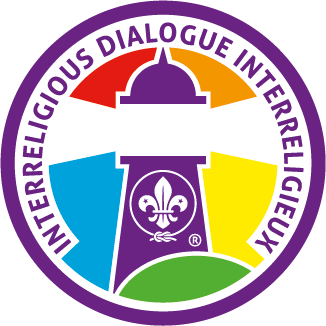En cours d’actualisation (septembre 2024)
Ce programme fait partie des priorités stratégiques de l’OMMS dans le domaine de la diversité et de l’inclusion. Ce qui veut dire que ce programme « Brevet Dialogue interreligieux » est ouvert à tous.
Il n’est pas demandé de se définir comme « religieux » pour y participer. Qui peut prédire en effet nos engagements religieux et spirituels à venir ?
Avec l’aide d’adultes référents, ce programme propose aux jeunes aînés de partir à la découverte du fait religieux qui structure la famille humaine, à la « découverte de l’invisible ».
Le mouvement scout offre ainsi aux jeunes aînés un temps de vie spirituelle pour leur permettre de se questionner dans le dialogue avec d’autres persones – en confiance – dans la réflexion et l’action.
OBJECTIF DE CE PROGRAMME
Le Badge Dialogue interreligieux a pour but d’aider les jeunes aînés à devenir plus capable et confiant dans le domaine du développement spirituel et religieux par leur participation active dans la fraternité interreligieuse.
Le Badge Dialogue interreligieux s’adresse aux branches aînés (Rovers, Routiers, Pionniers, Compagnons, …). Chaque organisation/association scoute nationale précisera la branche concernée, mais il est souhaitable que ce programme ne s’adresse pas à des jeunes de moins de 15 ans.
Le Badge Dialogue interreligieux fait partie du programme mondial « Un Meilleur Monde » (Better World Framework) qui permet aux jeunes des branches aînées de se découvrir, se comprendre et s’apprécier dans un monde (ínter)religieux.
Ce programme encourage les jeunes aînés à grandir en responsabilité spirituelle en vivant pleinement leur :
• Devoir envers Dieu – par leur participation active à la vie religieuse de leur communauté ;
• Devoir envers les autres - par leur engagement actif dans la fraternité et le dialogue interreligieux au sein de la famille humaine ;
• Devoir envers soi – par l’approfondissement de leur réflexion, leur questionnement sur leur identité spirituelle, leur religion.
RÉSEAU DIALOGUE INTERRELIGIEUX
Une commmunauté scoute appelée « Réseau Dialogue interreligieux » sera créée rassemblant les jeunes porteurs du Badge Dialogue interreligieux et les adultes au service de ce programme.
Ensemble, ils permettront le développement de ce programme au niveau mondial et seront au service du mouvement scout pour faire vivre la dimension spirituelle et religieuse, notamment lors des grands rassemblements mondiaux (Jamborees, Moots, …).
Interreligious Dialogue Badge | Requirements
To be a member of the Interreligious Dialogue Network you must:
Be aged 17/18 to 25 and a member of a NSO/NSA
Register with your NSO/NSA and obtain your Interreligious Dialogue Challenge passport
Choose a mentor
Attend a nature Discovery Retreat, lasting a minimum of four days, based on the three themes:
- Religious Traditions
- The Person – “Exploring the invisible“
- The Human Family
With the support of your mentor, finalise your plans for your voluntary service based on the theme explored on your Discovery Retreat
Contribute to a minimum of two section meetings for youth sections of your NSO/NSA and explore your chosen theme with them (see WOSM Interreligious Badge guidelines)
Undertake Interreligious Dialogue voluntary Service, either in your country or abroad, lasting a minimum of 14 days
Record and evaluate your experiences in your Interreligious Dialogue Challenge passport
Meet with your mentor and report on what you have achieved during your Interreligious Dialogue voluntary service. This should include feedback from the community which benefited from your project
Present the report of your Interreligious Dialogue Challenge to the Interreligious Dialogue Network
 The Interreligious Dialogue Badge - Fields of action
The Interreligious Dialogue Badge - Fields of action
The Interreligious Dialogue Challenge consists of three fields of action:
1. KNOWLEDGE | Religious Traditions (Duty to God)
Religion and Culture
Discovery of religious traditions: major beliefs, sacred texts, festivities and ceremonies, clothing, …
Religion and violence. Why?
Challenge of fundamentalism
Promoting dialogue and openness
Learning to live in harmony with others: Code of practices
2. ATTITUDE | “Explorer of the invisible” (Duty to Self)
Exploration involves going somewhere new
Exploration requires personal commitment
Exploration needs an engagement with its discoveries and experiences
Exploration has an effect on the explorer
Exploration requires appropriate training
Explorers make use of maps and guides
Exploration requires preparation and training
Exploration can be a life-long project
3. RELATIONSHIP | The Human Family (Duty to Others)
Respect for people’s diverse religious and non religious identities
Mutually inspiring relationship between people of different backgrounds
Common action for the common good
The Interreligious Dialogue Badge - Elements
The Interreligious Dialogue Badge consists of three elements:
1. The Interreligious Dialogue Discovery Retreat
Encourages scouts to discover the Interreligious Dialogue programme with their mentors, and to start exploring their own path, questionning their own identity and their relationship with God. This Discovery Retreat should be incredibly dynamic with talks, songs and dances, silence and meditation, small group interaction and community-building experiences. An opportunity to understand religious beliefs other than one’s own as a key element of tolerance, since faith traditions often define a significant part of a person’s identity.
2. The Interreligious Dialogue Service (living Pluralism within Scouting)
ex: Interreligious Dialogue Service Team for Faith & Beliefs zone at world, regional, and national scout events.
3. The Interreligious Dialogue Network (Active Coexistence)
To be organised by the Interreligious Forum of World Scouting (IFoWS) in partnership with National Scout Organisations (NSOs) and National Scout Associations (NSAs).






